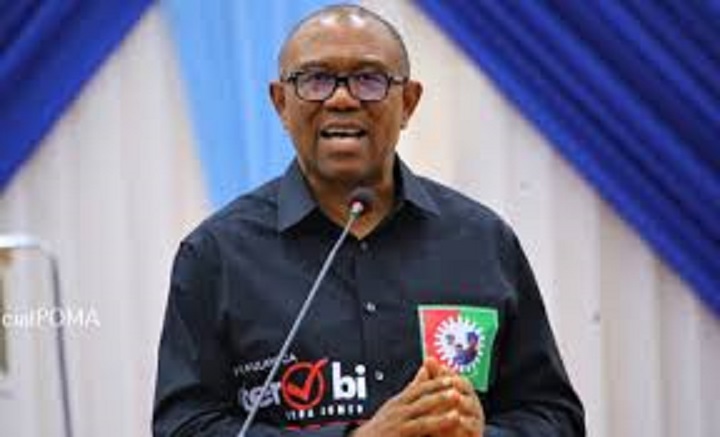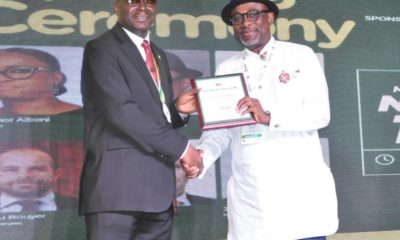Other News
Local Content law saves Nigeria US$2bn on LNG Train 7- Wabote
The other consortium had no footprint in-country and it proposed to put extra US$2bn on the back of the project to develop local capacity to execute the project. This is evidence of cost savings associated with the development of Local Content.”

Modupe ASUDO

Executive Secretary NCDMB, Engr, SK Wabote
LAGOS-THE pragmatic implementation of the Nigerian Oil and Gas Industry Content Development (NOGICD) Act has saved Nigeria the sum of US$2bn in the Engineering Procurement and Construction (EPC) contract for Nigeria LNG Train 7 Project.
The Executive Secretary of the Nigerian Content Development and Monitoring Board (NCDMB), Engr. Simbi Kesiye Wabote dropped the hint on Thursday at the 2020 Annual Capacity Building Workshop organised by the Board for the Judiciary.
The workshop was held via zoom and it drew over 117 participants, including Justices of the Supreme Court, Appeal Court, National Industrial Court, Federal High Court and external solicitors.
Wabote delivered the keynote address at the workshop and stated that contrary to wrong insinuations held in some quarters, ample evidence has proven that sustainable Local Content practice reduces the cost of oil and gas projects in addition to creating job opportunities and economic prosperity.
He gave example with the LNG Train 7 EPC bid, where Saipem Contracting Nigeria and its consortium won the contract with a much lower bid than its competitor, leveraging its commitment to Local Content and investments in Nigeria in the last 50 years.
He said: ”In the LNG Train 7 project contract which was recently concluded and awarded, the difference in price between Saipem that had established itself in Nigeria and the second lowest bidder that was coming from outside the country was US$2bn. That’s a huge sum of money that this country would have lost if not for the drive for the development of Local Content.
“The other consortium had no footprint in-country and it proposed to put extra US$2bn on the back of the project to develop local capacity to execute the project. This is evidence of cost savings associated with the development of Local Content.”
Admitting that developing Local Content and building capacity would always entail some costs at the beginning, the Executive Secretary insisted that such costs ultimately gets reduced overtime and creates much needed jobs and stability in the polity.
He also clarified that the focus of Nigerian Content implementation is not Nigerianization, rather it encourages domiciliation of capacities and promotion of foreign direct investments and home grown investments.
He assured that the NOGICD Act would always protect investments in-country, adding that companies that build capacities are given first right of refusal in industry projects. “The law is a protective instrument for businesses. There are cable manufacturers in Lagos. If there is any opportunity to supply cables to oil and gas companies in Nigeria, those companies have the right of first refusal.”
On the possibility of recording 100 percent Nigerian Content in the sector, the Local Content boss clarified that “the aspiration is neither possible nor desirable, especially for a developing country like Nigeria. You still need foreign direct investments. The industry is a very vast business, with high intensive technology. You still need to leave some space for foreign participation and investment to grow the industry. But you are going to see 70 percent. That is our aspiration, growing from five percent which was the level when Nigerian Content started.”
Speaking further, the Executive Secretary said Nigerian Content implementation led to the development of huge infrastructural and human capacities, which kept the operations of the oil and gas industry running smoothly at the height of COVID-19, notwithstanding the exit of most expatriates. ”Despite the impact of COVID-19 and expatriates leaving the country, Nigeria’s crude oil production never stopped. We still produced to the limit that were stipulated for us by OPEC. This confirms that Nigerian Content helped the oil and gas industry and ensured that we never felt the impact of COVID-19,” he said.
The Chief Justice of Nigeria, Hon Justice Ibrahim Tanko Muhammed delivered the opening remarks at the workshop, represented by Hon. Justice Olukayode Ariwoola JSC. He described the implementation of Local Content policies across the globe as an apparatus through which citizens of oil rich countries derive value from crude oil resources.
He also thanked the NCDMB for enhancing the capacity of the judiciary to dispense justice from an informed and contemporary position, particularly as it related to Local Content development and oil and gas operations.
Mrs. Rose Chukwuonwe, a Director of Periscope Consulting and former Coordinator Legal Services NCDMB set the background of the workshop. She indicated that one of the Board’s mandate as enshrined in the NOGICD Act, is to build in-country capacity and capabilities of key stakeholders and the legal sector is one of such important groups.
She noted that the workshop was expected to deepen the Justices’ understanding of the philosophy and objectives of the NOGICD Act, increase their understanding of the provisions of the Act and aid seamless implementation and enforcement of the Act.
The workshop was also expected to bridge the knowledge gap, create needed awareness of the workings of the Act and build the necessary synergy for effective implementation and enforcement of the NOGICD Act, she added.
In his comments, the Director of Legal Services, NCDMB, Barrister Mohammed Babangida Umar, stated that “no matter how good your law is, if you don’t have the support of the judiciary it becomes difficult to succeed.”
He assured that the Board would continue to build the capacity of the judiciary, especially the Justices, ”to enable them have a good understanding of the Local Content law, so that when matters around the Act come before them they will be in a good position to dispense Justice.”
Other News
Davido Is Richer Than His Billionaire Father – Ibrahim Chatta Claims
Renowned Nollywood actor, Ibrahim Chatta, has sparked conversation by claiming that award-winning singer Davido is richer and more influential than his billionaire father, Dr. Adedeji Adeleke.
Chatta made this statement while addressing the importance of respecting individuals in positions of authority, regardless of their age. He argued that accomplishments, not age, determine who an elder is. Using historical references, Chatta cited Alexander the Great, who achieved incredible feats before his death at 33, as an example of youthful greatness.
“God purposely placed some certain people in some positions, but you guys are looking at their age. It’s not about the age; any younger person that possesses things that belong to elders, is an elder,” Chatta said.
The actor emphasized that Davido’s wealth and influence surpass those of his father, despite Dr. Adeleke’s established status as a billionaire. Chatta highlighted the global recognition and adoration Davido commands, describing the singer as someone who garners immense loyalty and admiration.
“I was just looking at the numbers of people surrounding Davido the day I sat with him, I was just seeing how people were ready to be killed just to get to him. He is an elder. Davido’s father is a billionaire that has been doing big things before the singer’s arrival. His father is rich but not as Davido. If his dad is passing by, you might not recognise him, but if Davido passes here, a stampede will happen.”
Chatta’s remarks have stirred reactions across social media, with many debating whether fame and influence should outweigh wealth in defining success.
Other News
Rita Edochie Praises Donald Trump, Calls Him ‘Angel’

Veteran Nollywood actress, Rita Edochie, has expressed her admiration for Donald Trump, claiming that the entire world wishes for a leader like him.
The actress made this statement while celebrating Trump’s inauguration as the 47th President of the United States on January 20, 2025.
In a lengthy Instagram post, Edochie shared her unwavering support for Trump, despite facing criticism for her stance. She revealed that she is often referred to as “Mama Trump” by detractors but remains unfazed by their remarks.
READ MORE: Trump Dismisses Four Biden-Appointed Officials, Signals More Shake-ups
“January 20, 2025, marks a historic milestone as Trump takes oath of office as the 47th President of the United States. As you begin your new term, I wish you immense wisdom to tackle the challenges facing our nation,” Edochie wrote.
Describing Trump as an angel, she added, “After all, the entire universe wishes they had an Angel like Donald Trump to be their president.”
The actress also expressed her desire to see a leader in Nigeria who embodies Trump’s qualities, stating, “I do wish a man in the likeness of Trump be sworn into the Nigerian Executive Offices one day.”
Edochie’s comments have sparked discussions online, with many applauding her loyalty while others remain critical of her views.
Other News
Tunde Ednut Is A Remarkable Media Influencer – Peter Obi

Former Labour Party presidential candidate, Peter Obi, has taken to social media to celebrate the birthday of popular media influencer and entertainer, Tunde Ednut.
In a heartfelt post shared on Monday via X (formerly Twitter), Mr. Obi praised Tunde Ednut for his remarkable contributions to the entertainment industry.
The former Anambra State governor described Ednut as a creative and hardworking internet personality who has captivated audiences with his humor and consistency.
READ MORE: N12.3bn Fraud: Ex-First Bank Chair, Otudeko Flees Nigeria Ahead Of Arraignment
“Today, I join the world in celebrating the birthday of a remarkable Nigerian Media Influencer, Tunde Ednut,” Obi wrote.
“Tunde has earned his place as one of Nigeria’s most admired and hardworking internet celebrities, captivating audiences with his creativity, humor, and consistency.”
Acknowledging Ednut’s influence and ability to connect with people across borders, Obi lauded him as a significant force in the digital entertainment space.
He also extended his best wishes for good health, success, and continued contributions to the nation’s development.
“His impact on digital entertainment and his ability to connect with people across borders is truly remarkable, making him a force in the industry. On this special day, I wish Tunde Ednut good health of mind and body, continued success, and many more productive years ahead, as he continues to contribute to the development of our nation. Happy birthday, Tunde Ednut!”




















